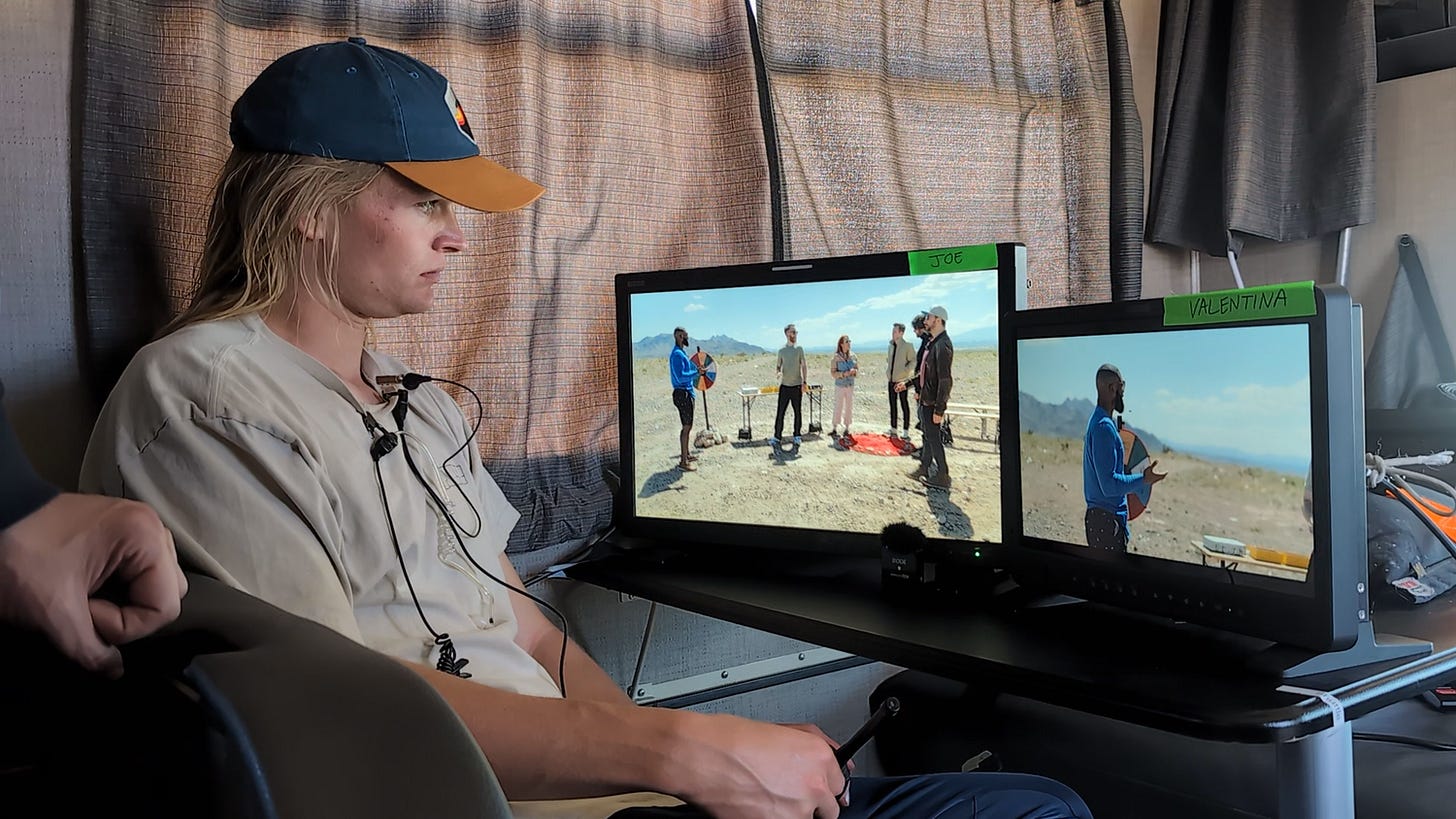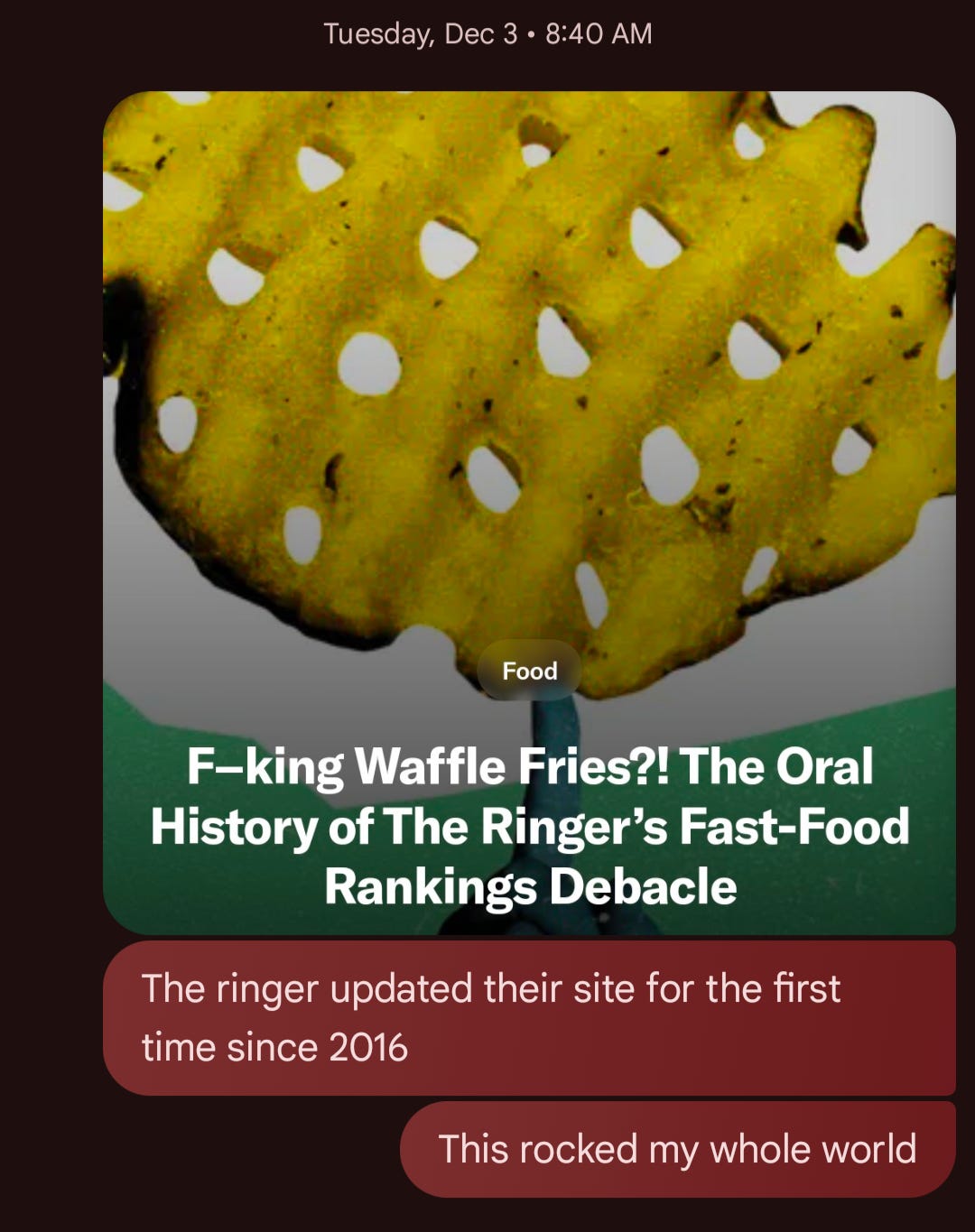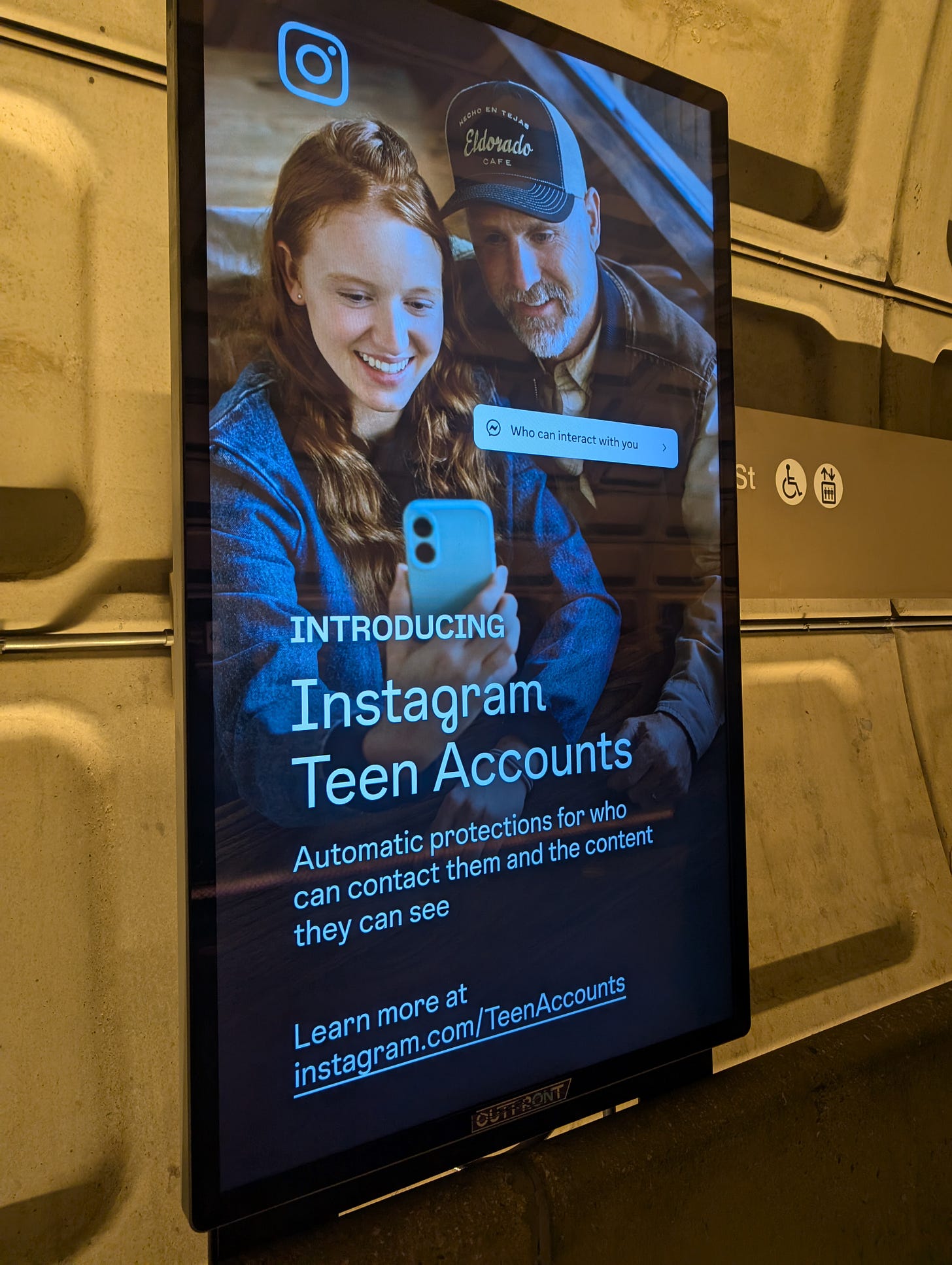My Roman Empire ⚔️
A noteworthy site redesign says a lot about modern media
blog.nineteen // I’m in the midst of a bit of a sprint right now.
Among a smattering of things, my main focus is a longform piece I’ve been working on over the course of the year. I won’t pretend like it’s some big secret—I’ve made plenty of references in this blog as to what, and whom, it’s about. But I’m really proud of how it’s coming along, and I can’t wait to (hopefully) share it soon.
A lot has happened in 2024. I spoke at VidCon, finally put out my short film, drove across the country (twice), and helped Vicky move to Geneva—all while writing over a hundred newsletters and producing nine podcasts for Publish. To say it’s been difficult to balance everything would be putting it mildly.
Yet when it comes to committing to my craft, I’ve tried to be as protective as possible of my mental energy and time so that I can complete two longform stories. The first, “The Year Creators Went Hollywood,” was a deep-dive exploration of the entertainment industry’s collision course with YouTube. It featured interviews with over a dozen creators and insiders, easily marking the most in-depth (*sums up the courage to admit he’s a journalist*) reporting I’ve ever done.
While the second piece focuses on two brothers, the scale of the story is just as big—if not bigger. It’s been a fun nut to crack, with many days seeing me staring blankly at the computer, no words coming out.
Nonetheless, I’ve learned over the years that the most important part of writing is showing up, day after day, week after week. Eventually, the puzzle pieces come together.
In the meantime, it’s been three weeks since I wrote this blog in my established, “Five Things I Think (I Think)” format. Scroll down for timely thoughts on creator culture, social infrastructure, and something we call media from your favorite thoughtboi.
— NGL
P.S. Last week, I wrote about how the ethical concerns of AI proliferation have been put on the backburner—and dropped my first pod on the ‘stack. If you missed it, check it out here.
I think my Roman Empire can be boiled down to two words: “The” and “Ringer.” If you’ve talked to me pretty much any time during the last eight years, you probably know I’m a daily reader and listener of The Ringer, the pop culture publication and podcast network launched by Bill Simmons in 2016.
I entered The Ringer-Verse through my love for Simmons’ previous publication Grantland, as well as way-too-deep dives on Game of Thrones and MCU lore.* I’ve stayed for podcasts such as Bryan Curtis’ OG media analysis show, The Press Box, and The Rewatchables squad’s tenth discussion of the heist movie Heat.**
The Ringer also served as inspiration for my first publication, Unplugg’d. The quick pitch I used to share with people was “I’m creating The Ringer for Gen Z.” Plus, if I’m referencing a movie that you’ve never heard of—or have a surprising amount of knowledge of the NBA MVP race, even if I haven’t watched a game in years—just know those takes are most likely not coming exclusively from some magical, encyclopedic recess of my brain.
So imagine how much my whole world was rocked at the beginning of the month, when The Ringer dropped a massive overhaul of their site design for the first time I can remember.
It’s no longer the straightforward blog with graphic assemblies of Getty images straight out of the 2010s. Now, there’s fun, colorful animations; distinctly marked sections like “Today’s Mix” and “Spotlight; in-article footnotes reminiscent of Simmons’ bestseller, The Book of Basketball; and a heckuva lot of embedded podcasts and videos.
And I…kind of love it?
It took a while for me to arrive here. Like any major UI redesign to something you’ve been using for years, the first experience is jarring. Yet past this momentous event setting off an earthquake in my brain (making me realize that this was, in fact, my Roman Empire), it acted as a reckoning of sorts, acknowledging how much the media landscape has shifted.
In other words, it’s never been harder to run a website-based media business—especially a free one that depends on advertising to survive.
SEO is dead. Google’s latest sweeping algorithm changes now prioritize Reddit posts and its own AI-generated summaries of the websites it scrapes.
Social media referral traffic is a thing of the past, too. Twitter used to love having journalists link to their work, as it made the platform the premier destination to discover the best trending stories. Now, most platforms place a high priority on keeping their users on their sites for as long as possible; native creators, therefore, are a much bigger focus than journalists’ work that is best consumed elsewhere.
On top of that, Elon Musk set off a Text Content Cold War when the crumbling debris of Twitter began marking links to Substack posts as “unsafe.”*** These days, he instead touts (and amplifies) misinformation from “citizen journalists” like Colin Rugg, a former backup DII quarterback and “investor” who started posting content regularly on X in 2022. Rugg claims to pull billions of views on the platform and grew to over a million followers in just seventeen months.
Luckily for The Ringer team, they differentiated from the jump, going all in on podcasting. The move paid off when audio streaming giant Spotify purchased the media company in 2020 for two hundred million dollars, expanding the network with a wide-ranging group of talent from there.
Nevertheless, Simmons often says that publications build a voice through writing, then monetize through podcasting. Many contemporary websites may be loss leaders compared to the money-printing blogs of the aughts. Yet they offer an entry point into a brand’s world—even if only a handful of sociopaths like me still read nearly every new word on the site.
Look no further than The Verge, whose buzzy redesign in 2022 features original reporting mixed in with quick-hitting microblogging. Or The New York Times and Wired, which have both recently introduced vertical video to their homepages in an effort to tell stories natively via the hottest format in media.
The best websites moving forward are destinations that don’t just drive engagement—they also form a positive relationship with readers and viewers. It’s a lesson I’m looking to emulate as I rebuild the world of Powder Blue.**** And while things looked shaky for a second there, it doesn’t look like my Roman Empire is falling…just yet.
I think gatekeepers are going to become important again, even if it smacks of élitism. I just talked about The Ringer for a thousand words, so it’s only fitting that I now reference one of their podcasts.
I really enjoyed John Landgraf’s recent two-part appearance on The Town. The FX chief (who’s been leading the network for the last two decades), is coming off a heater of a year, winning thirty-six Emmys for shows like Shōgun and The Bear.
Even as FX was swallowed by Disney’s 21st Century Fox acquisition in 2019—making the network’s shows part of the larger conglomerate’s Disney+ streaming service—Landgraf shares some fiery words on this pod for the “tech companies” that are staking claims over more and more of the entertainment landscape (he labels them as Amazon, Apple, and Google’s YouTube TV).
The way Landgraf sees it, these companies have an unlimited pool of cash to spend on original programming, and their bottom lines aren’t really affected by the success of their content. Therefore, they’ve upended Hollywood by cutting big checks to top talent and pumping out content at a torrid pace… undercutting the traditional talent pipeline of training producers and screenwriters in the process.
This reminded me of a conversation I had with Dave Wiskus, the CEO of creator-owned streaming platform Nebula, earlier this year. Dave wants to bridge the gap of YouTube and Hollywood, building a new pipeline that teaches creators how to run a set. In a world that feels like it’s increasingly diverging into two paths—the hundred-million-dollar productions and the indies—why can’t a company like Nebula plug right into the latter path?

Another Landgraf quote stuck out to me more, though. “We have something to offer that tech doesn’t,” he opined, stating that the elusive things called “taste” was the ultimate differentiator. This idea of taste is exclusive by nature. When I interviewed veteran YouTube creators Rhett and Link earlier this year, they opened up about their frustrations with Hollywood studios that shot down their ideas for two decades—even as their videos reached billions online. Why need gatekeepers for their latest original TV show when the YouTube algorithm had proven viewers love their content, time and time again?
Yet Landgraf’s track record speaks for itself, and the proof is in the pudding. One could argue that Emmys don’t mean anything if the shows that win are watched by a vast minority of consumers, but that’s been the story of most art for millennia, no?
Besides, the TikTok-ification of everything means that views are cheaper than ever before. They’re no longer a differentiator or sign of what “matters.” You know what is a differentiator for creatives, though? Gatekept things like magazine covers and award shows.
I think the Internet is about “I,” and movies and TV are about “we.” I’m calling myself out here, as I love both writing and reading stories in first-person.
But this was another hill that Landgraf was willing to die on, and I kind of agree with him. The Internet, as he sees it, is all about watch me, subscribe to me.***** The format of storytelling has changed alongside its distribution.
Here’s the paraphrased quote:
“The thing that’s amazing about television and film is that they’re in third person…[while] the Internet is a first-person medium.
We gathered together to watch stories about other people. We had professional writers and actors portraying characters that gave us experiences in other people’s lives, and stories about empathy and politics and meaning.
We had a common culture…now, you’ve lost the notion of a human person or group of writers in a room, [laboring] over the question of what story will be meaningful and entertaining and surprising to people.”
This struck me when seeing A Real Pain and Anora in theaters recently. Nearly every seat was full at both showings. During comedic moments, the entire room shook with laughter; in tense moments (like the roof scene in A Real Pain, or the closing shot of Anora), you could hear a pin drop. And afterwards, both films prompted at least a half-hour of discussion on the walk and train ride back, respectively.
I don’t believe it’s impossible for creator platforms to produce a certain type of communal moment. Kai Cenat’s recent streaming marathon drew hundreds of thousands of live viewers and led to many viral clips, after all.
But I can’t shake the feeling that watching a streamer like Kai is still all about him and his accomplishments—mainly, breaking records by constantly reminding the people tuning in that they’re currently paying the streamer a membership fee.******
I think that if you know, you know. On the topic of gassing yourself up and talking about your accomplishments, I really liked this quote from Pharrell in his recent interview with GQ:
“Silence is an exercise. Allowing your work to speak for you is an exercise. Being okay with the fact that most people are going to miss it. Being extra okay with the fact that the people who don’t miss it, who decide they want to act like it was their idea—they’re going to get very loud about it, and they’re going to get the credit for it.
Until some of the real sleuths out there will be like, ‘Nah, here go the receipts.’ And you wait on that. But you stay in silence. Nigo-san, he taught me that. He don’t say nothing. As Pusha says: If you know, you know.”
That's the reason we ball for / Circle 'round twice for the encore (If you know, you know).
I think advertising really just boils down to knowing your target audience. Only in DC will you see ads from Instagram while waiting for the subway, as Meta touts their moves to make their platform safer.
If you spend even just a week in the District, you’ll notice a lot of ads like these from Google, Meta, and other tech companies. That’s because they know policymakers ride the train to work every day—and the companies will spend every last dollar to convince politicos that their platforms aren’t actually that bad.*******
In other words, business is booming on K Street.
Thanks for reading! Shoot me a reply, comment, or DM if anything resonated with you in particular—I respond to them all.
* Okay, but for real—Charles Holmes and Van Lathan are dynamite together on the ‘Ringer-Verse’ recap pods.
** Well, ya know, for me, the action is the juice.
*** Turns out it’s because Musk tried to purchase Substack in 2023, to which the founders said no, they revealed last month.
**** Oh!?
***** This is the part where I acknowledge I’m playing the Great Internet Game, just like everyone on this platform.
****** I’ll never understand Twitch culture, man.
******* This is also why Politico and Axios sold for hundreds of millions of dollars in recent years, attracting Beltway readers…then building a sustainable advertising business buoyed by Google and Meta. Also unrelated—seven asterisks must be a record for a single blog post.







